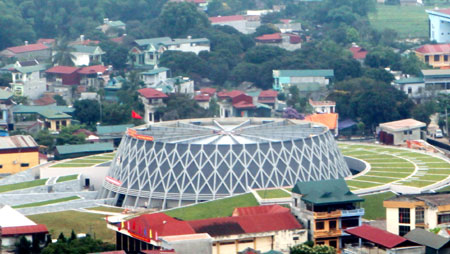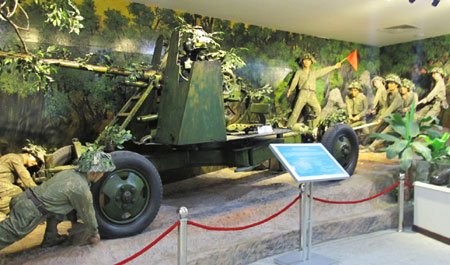New museum commemorates Dien Bien Phu victory

An overview of Dien Bien Phu Victory Museum. Photo by qdnd
Tourists will learn about the victory through the photos and objects displayed at the new Dien Bien Phu Victory Museum. It has been rebuilt from the old museum which was established in 1984 on one of the many relic sites in the northern province of Dien Bien. It houses many valuable documents and objects related to the historic Dien Bien Phu campaign.
The victory played a decisive role in ending Vietnam's resistance war against the French forces and in bringing new momentum to Vietnam's revolution and the struggle for peace, national independence and socialism.
The battle occurred in Dien Bien between March and May 1954 under the command of General Vo Nguyen Giap. The victory led to the signing of the 1954 Geneva Accord in which France agreed to withdraw its forces from the colonies in Indochina.
Located in Muong Thanh District, Dien Bien city, the old museum displays 270 objects and more than 200 paintings and photos of great historical value. It also has huge outdoor exhibits such as artillery guns, cannons, tanks and machine guns.
It was upgraded at the end of 2003, and its exhibition sections were reorganised to give visitors a panoramic view of the nine-year long resistance war against the French and the remarkable Dien Bien Phu victory.
Spread over a total area of 7,000 square metres, the new museum has about 1,000 objects divided into five exhibit sections, featuring the strategic location of Dien Bien Phu, the enemy's scheme at Dien Bien Phu, the Party's guideline regarding preparations for the Dien Bien Phu Campaign, the impact of Dien Bien Phu at home and abroad and the present-day Dien Bien Phu.

The indoor exhibition area in the new museum is triple the size of the old one.
On the occasion, a statue of late General Vo Nguyen Giap was donated to the museum April 30.
Measuring 83 centimetres in height and weighing 115 kilograms, the bronze statue sits in the commemorative room of the museum. It is an expression of gratitude for the great contributions made by the general to the Vietnamese revolution, particularly the Dien Bien Phu victory.
It also helps to educate Vietnamese people, especially the younger generations, about the moral values and talents of General Giap, who was born in 1911 in the central province of Quang Binh. He passed away in Hanoi last year at the age of 103.
Along with the statue, the room also has photos of heroes of the People's Armed Forces, and the youth volunteers who transported supplies to the battlefield during Dien Bien Phu campaign.
What the stars mean:
★ Poor ★ ★ Promising ★★★ Good ★★★★ Very good ★★★★★ Exceptional
Latest News
More News
- Vietjet launches mega year-end ticket promotion (December 10, 2025 | 11:33)
- Vietjet launches daily Manila flights to celebrate year-end festive peak season (December 05, 2025 | 13:47)
- Phu Tho emerges as northern Vietnam’s new tourism hub (December 01, 2025 | 17:00)
- Vietjet completes Airbus A320/A321 updates ahead of deadline (December 01, 2025 | 09:49)
- Vietjet resumes Con Dao flights from early December (November 28, 2025 | 15:24)
- Free tickets, Lunar New Year promotions on offer at Vietjet Mega Livestream (November 26, 2025 | 15:32)
- UNIQLO unveils upgraded heat-retention wear at Hanoi event (October 26, 2025 | 10:00)
- Vietnam named among world’s top four culinary destinations (October 24, 2025 | 17:09)
- Vietnam and Denmark strengthen dialogue on sustainable fashion (October 20, 2025 | 09:11)
- Fusion rolls out special initiatives to celebrate Vietnamese Women’s Day (October 17, 2025 | 20:00)
















 Mobile Version
Mobile Version